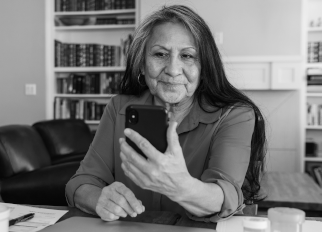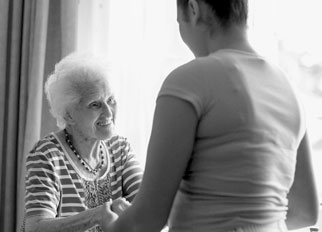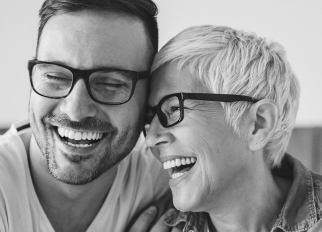Take time to fit yourself into your schedule
Love yourself like you love your best friend
When your loved ones need you, you’re there. You drop everything and show up — physically and mentally — to offer support, any way you can. Now it’s time to do that for yourself.
Your Blue Cross Blue Shield of Michigan plan gives you convenient options, like a hotline you can call 24/7, online therapy sessions, no-cost webinars and more. It’s never been easier to make yourself a priority. You’d want it for them, so do it for you, too.
Primary care physician
Your partner in seeking treatment
If you're looking for an easy way to connect with a mental health professional, make an appointment with your PCP for a list of references. They may have other behavioral or mental health options for you to try as well.
Don’t have a PCP? You can log in to your Blue Cross Blue Shield of Michigan member account to find one.
Women are twice as likely as men to have anxiety and depression.² ³
Anxiety
Women with anxiety tend to have persistent, excessive fear or worry in situations that are not threatening.4
-
A sense of apprehension or dread
-
Feeling restless, nervous or irritable
-
Having a racing or pounding heart
-
Feeling you can't catch your breath
-
Having an upset stomach or 'knots'
Depression
Women with depression have a series of symptoms — including hopelessness — that lasts longer than two weeks.5
-
Feeling hopeless or guilty
-
Loss of interest in activities
-
Having trouble concentrating
-
Having physical aches and pains
-
Changes in sleep or appetite
Daily practices for anxiety and depression

If you’re experiencing symptoms of anxiety or depression, please seek support. You have flexible options with your Blue Cross plan that can help fit ‘you’ back in your schedule.
You can also use these at-home strategies to manage everyday stress:
Reduce commitments
If you feel overwhelmed or stretched too thin, consider limiting your commitments. Saying ‘No’ is hard and takes practice. But oftentimes, saying ‘No’ to others means saying ‘Yes’ to yourself.
Set personal goals
Depression can make you feel fatigued and throw off your regular routine. Setting a few goals to accomplish during the day and including time to be physically active can help improve your mood and energy levels.
Nourish your body
Your physical self is connected to your emotional self. Eating nutrient-rich foods — and avoiding stimulants like caffeine, and depressants like alcohol — can help you find balance overall.

DID YOU KNOW
Drinking can affect your mental health
Alcohol might seem like a quick way to relax, but it can take a toll on your mind and body. It can weaken your immune system and increase your anxiety. It also raises the risk of long-term health issues.

PODCAST
How to identify and manage stress
Taking control of your stress starts with understanding the cause of it.
This podcast can help you learn simple strategies to identify your unique triggers and develop healthier ways to manage stress.
Support for older women facing loneliness

Finding ways to stay social can help you stay healthy
Social isolation can pose a threat to both physical and mental health for anyone, but especially for seniors. Limited human contact is even linked to many chronic conditions including depression, heart disease and high blood pressure.4 Blue Cross Blue Shield of Michigan believes in the healing power of human connection, even when it may feel tough to do so. Here are a few suggestions for helping to cope with isolation or loneliness.
Here are a few easy ways to stay connected:
- Invite a friend to go on a walk or have a video chat.
- Sign up for an online class or hobby group.
- Try an online group exercise program like SilverSneakers®.
If you’re a senior, explore these resources to help support your overall well-being.
Crisis assistance

How to Maintain Balance Between Mental and Physical Health
Just how connected are a person’s mental and physical health? More than most people realize.
Learn what you can do
Five ways women can take care of their whole health
Get some practical tips on how to care for your body, mind and emotional well-being.
Get expert tips
Menopause and mental health
The relationship between menopause and mental health is complex. Here’s what to know and some tips to support your mental health.
Learn about the connection
You've got the most important job in the world. Let us help you through it.
See parent's guide



Good health unites all of us. Get tips for a strong mind-body connection.
See member's guide- Mental Health by the Numbers, National Alliance on Mental Illness
- Women Nearly Twice as Likely to Have Anxiety as Men, British Broadcasting Corporation
- Depression in Women: Understanding the Gender Gap, Mayo Clinic
- Social isolation, loneliness in older people pose health risks, National Institute on Aging
SilverSneakers is a registered trademark of Tivity Health, Inc. The National Suicide Prevention Lifeline and National Domestic Violence Hotline are independent companies, not affiliated with Blue Cross Blue Shield of Michigan.
The information contained on this webpage is for educational purposes only. Nothing on this webpage is intended to be, nor should be used as or relied upon as, professional medical advice. Nothing contained on this webpage is intended to be used for medical diagnosis or treatment. For medical advice, or to receive medical diagnosis or treatment, consult with your health care provider.


